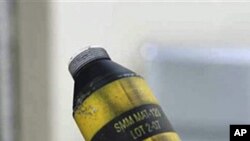Campaigners working for a world free of cluster munitions say impressive gains have been made in implementing the Convention that bans the production, use and stockpiling of cluster munitions since it came into force 11 months ago. More than 400 representatives from 81 countries are wrapping up a four-day meeting to assess progress on the ban and to discuss the challenges ahead.
Since the treaty became binding international law on August 1, 2010, 109 States have joined the Convention and 58 have ratified it. The umbrella group overseeing the Convention, the Cluster Munition Coalition, calls this an impressive achievement for a Convention that is so young.
Chair of the Coalition, Steve Goose, says the treaty to ban cluster munitions is off to a roaring start and is making a real and concrete difference in saving lives and preventing future casualties. He notes cluster munitions do not discriminate between civilian and military targets. Many of them fail to explode immediately and can lie hidden for years, killing and maiming civilians, including children, even decades after the original conflict is over.
He says two States parties, Albania and Zambia, have completed clearance of their contaminated land and eight State-parties and three signatories to the Convention have completed the destruction of their stockpiles of cluster munitions.
“They are allowed eight years to do this under the Convention and here eight States-parties and at least three signatories have already finished, including an announcement from Hungary just this past week that they had completed," said Goose. "Together, States-Parties have already destroyed more than 64 million sub-munitions, contained in almost 600,000 cluster munitions. More than 64 million sub-munitions already destroyed. Sub-munitions that will now never take a civilian casualty.”
But, problems remain. The Coalition, the International Committee of the Red Cross and seven countries condemn the recent use of cluster bombs by Thailand and Libya. Thailand fired cluster munitions into Cambodia earlier this year during a border dispute.
Interestingly, Goose says both Thailand and Cambodia now indicate they are taking steps to accede to the Convention in the near future.
He says Libya remains of great concern. He notes Libyan government forces used 120 cluster munitions during the current armed conflict. And, at least three cluster munitions exploded over the city of Misrata. He says the Coalition worries Libya will use these indiscriminate weapons again.
He says a big challenge facing the Coalition is to get every State in the world to join the Convention. He says major holdouts include the United States, Russia, China, India, Pakistan and Israel. He says it is particularly important to get them on board.
“The reason why States have stayed away are, in part because countries like the United States and Russia and China have so many of them," he said. "The United States has five million cluster munitions that contain about 700 million sub-munitions. It is likely that Russia and China have similar stockpiles.”
The United States has declared it plans to get rid of its cluster munitions by 2018.
However, Goose says he is convinced the Convention will be a success because advocates of a ban have stigmatized cluster munitions to such an extent that almost every State agrees they should not be used. He says this stigmatization will act as a potent deterrent to their use.
Impressive Gains Noted In Implementing Treaty To Ban Cluster Munitions
- By Lisa Schlein






